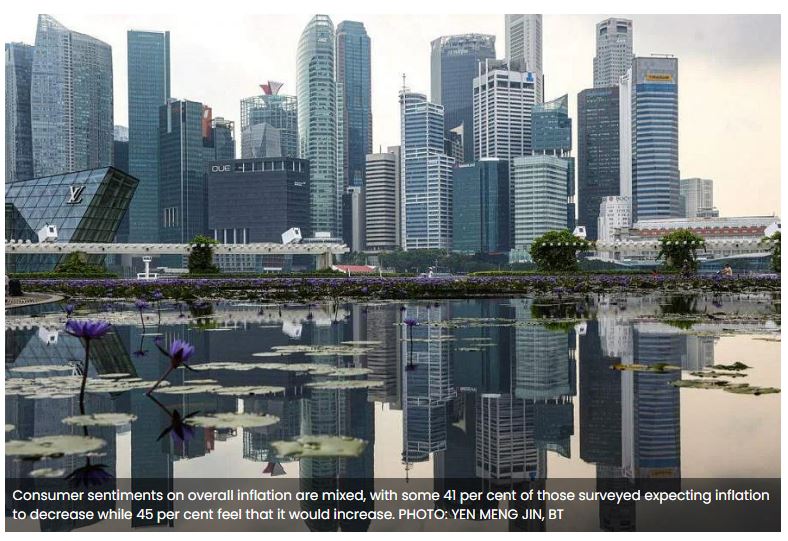Singapore’s inflation expectations dip with higher interest rates, global headwinds: poll
SINGAPOREANS’ headline inflation expectations for the year ahead fell, down to 3.8 per cent in a December poll from an 11-year high of 4.6 per cent in September 2022, according to the latest quarterly results of the Singapore Index of Inflation Expectations (Sindex).
However, the fourth quarter one-year-ahead inflation expectations are still higher than the average one-year-ahead expectations of 3.2 per cent since inception in 2011.
The Sindex report, published on Monday (Jan 16) jointly by DBS and Singapore Management University (SMU), is derived from an online survey of 500 randomly selected individuals that represent a cross-section of Singaporean households.
DBS and SMU noted that consumers saw a moderately negative impact from the pandemic on Singapore’s economic growth, given global uncertainty, tightening of monetary policies, and economic and geopolitical disruptions.
Singapore consumers also felt that over the next 12 months, they expect to spend slightly more due to price increases despite possible cutbacks on consumption.
DBS and SMU observed a distinct bimodal distribution, which means there are two large groups who disagree on whether the impact would be positive or negative. Consumer sentiment on overall inflation was mixed, with some 41 per cent of those surveyed expecting inflation to decrease while 45 per cent felt that it would increase.
The elevated risk of a global downturn in the face of rising interest rates to tackle persistent inflation and cost of living is causing a “cognitive dissonance” among both consumers and policy economists, said SMU assistant professor of finance and founding principal investigator of the DBS-SKBI Sindex project, Aurobindo Ghosh.
“Domestically, despite a forward guidance of a strong Singapore dollar by the MAS (Monetary Authority of Singapore), Singapore consumers are facing elevated price pressures from a tighter labour market, accommodation, utility, food costs and potentially a higher GST (goods and services tax) rate of 8 per cent,” he added.
However, there is a more stable decline in long-term inflation expectations, raising the hope of more grounded inflation expectations to a new normal, said Ghosh.
Ghosh also attributed reducing inflationary expectations to the slowdown in global growth and central banks in major economies raising interest rates.
“Resolution of pandemic-induced supply chain disruptions are also expected to relieve price pressures,” he said.
After accommodating for potential behavioural biases, free response overall inflation expectations notably remained unchanged at 6 per cent in December compared to September.
Data from MAS forecast a median of 5.2 per cent for consumer price index (CPI) all-items inflation in 2023.
The latest CPI data from the Department of Statistics also showed a 6.1 per cent year-on-year increase for CPI all-items in January to November 2022, with the latest November monthly inflation print coming in at 6.7 per cent year on year.
The overall CPIEx Inflation Expectations, after adjusting for potential component-wise behavioural biases and recombining across components, increased slightly to 6.4 per cent in December, from 5.7 per cent in September.
Inflation expectations of all individual components also recorded some divergence. Expectations across components including food, healthcare, and housing and utilities rose. However, expectations for transport inflation dipped to 7 per cent from 8 per cent in December.
Remaining components’ inflation expectations remained steady at 5 per cent.
Core inflation expectations for the year ahead also dropped to 3.6 per cent for a subgroup of the population who own their accommodation and use public transport, from 4.6 per cent in September.
In addition, the December survey found that around 10.8 per cent of Singaporeans polled expect a more than 5 per cent reduction in salary in the next year, similar to the 10.2 per cent in September. The median salary increment expectations remained unchanged between 1 and 5 per cent.
As part of efforts to slow the momentum of inflation and ensure medium-term price stability, MAS further tightened monetary policy on Oct 14, 2022, its fifth consecutive tightening move since October 2021.
Source: https://www.businesstimes.com.sg/singapore/singapores-inflation-expectations-dip-higher-interest-rates-global-headwinds-poll


 Thailand
Thailand




